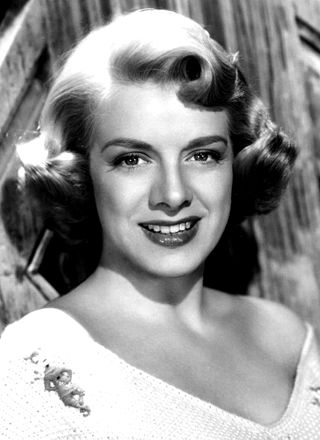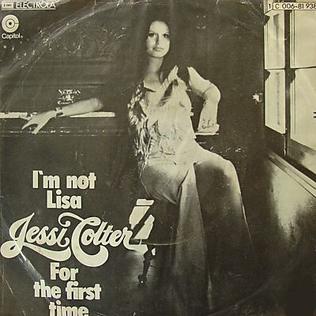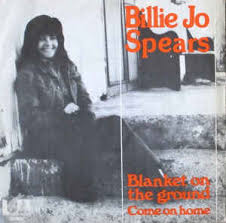Related Research Articles

Rosemary Clooney was an American singer and actress. She came to prominence in the early 1950s with the song "Come On-a My House", which was followed by other pop numbers such as "Botch-a-Me", "Mambo Italiano", "Tenderly", "Half as Much", "Hey There", "This Ole House", and "Sway". She also had success as a jazz vocalist. Clooney's career languished in the 1960s, partly because of problems related to depression and drug addiction, but revived in 1977, when her White Christmas co-star Bing Crosby asked her to appear with him at a show marking his 50th anniversary in show business. She continued recording until her death in 2002.

Deborah Anne Boone is an American singer, author, and actress. She is best known for her 1977 hit, "You Light Up My Life", which spent ten weeks at No. 1 on the Billboard Hot 100 chart and led to her winning the Grammy Award for Best New Artist the following year. Boone later focused her music career on country music, resulting in the 1980 No. 1 country hit "Are You on the Road to Lovin' Me Again". In the 1980s, she recorded Christian music which garnered her four top 10 Contemporary Christian albums as well as two more Grammys. Throughout her career, Boone has appeared in several musical theater productions and has co-authored many children's books with her husband Gabriel Ferrer.

Ross S. Bagdasarian Sr., known professionally by his stage name David Seville, was an Armenian-American singer, songwriter, record producer, and actor, best known for creating the cartoon band Alvin and the Chipmunks. Initially a stage and film actor, he rose to prominence in 1958 with the songs "Witch Doctor" and "The Chipmunk Song ", which both became Billboard number-one singles. He produced and directed The Alvin Show, which aired on CBS in 1961–1962.

"Mambo Italiano" is a popular song written by Bob Merrill in 1954 for the American singer Rosemary Clooney. The song became a hit for Clooney, reaching the top ten on record charts in the US and France and No. 1 on the UK Singles Chart in early 1955. The song has shown enduring popularity, with several cover versions and appearances in numerous films.
"This Ole House" is an American popular song written by Stuart Hamblen, and published in 1954. Rosemary Clooney's version reached the top of the popular music charts in both the US and the UK in 1954. The song again topped the UK chart in 1981 in a recording by Shakin' Stevens.
"In the Cool, Cool, Cool of the Evening" is a popular song with music by Hoagy Carmichael and lyrics by Johnny Mercer. It was originally planned to feature it in a Paramount film written for Betty Hutton that never took off, which was to be called The Mack Sennett Girl. The song was buried in Paramount's files until it was rediscovered and then used in the 1951 film Here Comes the Groom and won the Academy Award for Best Original Song.
"I Really Don't Want to Know" is a popular song written by Don Robertson (music) Howard Barnes (lyrics). The song was published in 1953.
"¿Quién será?" is a bolero-mambo song written by Mexican composers Luis Demetrio and Pablo Beltrán Ruiz. Beltrán recorded the song for the first time with his orchestra in 1953. Pedro Infante, for whom the song was written, recorded it in 1954.
"Come On-a My House" is a song performed by Rosemary Clooney and originally released in 1951. It was written by Ross Bagdasarian and his cousin, Armenian-American Pulitzer Prize-winning author William Saroyan, while driving across New Mexico in the summer of 1939. The melody is based on an Armenian folk song. The lyrics reference traditional Armenian customs of inviting over relatives and friends and providing them with a generously overflowing table of fruits, nuts, seeds, and other foods.
"Half as Much" is an American pop standard song written by Curley Williams in 1951. It was recorded by country music singer Hank Williams in 1952 and reached number two on the Billboard Country Singles chart.

"Abraham, Martin and John" is a 1968 song written by Dick Holler. It was first recorded by Dion, in a version that was a substantial North American chart hit in 1968–1969. Near-simultaneous cover versions by Smokey Robinson and the Miracles and Moms Mabley also charted in the U.S. in 1969, and a version that same year by Marvin Gaye became the hit version in the UK. It was also a hit as part of a medley for Tom Clay in 1971, and has subsequently been recorded by many other artists.

"Love Grows (Where My Rosemary Goes)" is the debut single by Edison Lighthouse. The song reached the number one spot on the UK Singles Chart on the week ending 31 January 1970, where it remained for a total of five weeks. It also became the first number one single of the 1970s (not counting Rolf Harris's "Two Little Boys" which was a holdover from 1969).

"I Will Follow Him" is a popular song that was first recorded in 1961 by Franck Pourcel, as an instrumental titled "Chariot". The song achieved its widest success when it was recorded by American singer Little Peggy March with English lyrics in 1963. The music was written by Franck Pourcel and Paul Mauriat. It was adapted by Arthur Altman. The completely new English lyrics were written by Norman Gimbel.

"It's in His Kiss" is a song written and composed by Rudy Clark. It was first released as a single in 1963 by Merry Clayton that did not chart. The song was made a hit a year later when recorded by Betty Everett, who hit No. 1 on the Cashbox magazine R&B charts with it in 1964. Recorded by dozens of artists and groups around the world in the decades since, the song became an international hit once again when remade by Cher in 1990.

"I'm Not Lisa" is a song by American country music artist Jessi Colter. It was released on January 16, 1975, as the lead single from her album I'm Jessi Colter. The song was Colter's first major hit as a solo artist.
"Round and Round" is a popular song by Joe Shapiro and Lou Stallman published in 1956. A version of the song was recorded by Perry Como for RCA Victor on January 15, 1957 and was a big hit that year.

"Blanket on the Ground" is a song written by Roger Bowling, and recorded by American country music singer Billie Jo Spears. It was released in February 1975 as the second single and title track from the album Blanket on the Ground. Irish born singer Philomena Begley covered the song as the lead single from her 1975 LP of the same name. The single was released on August 4, 1975 in Ireland and August 6, 1975 in the United Kingdom reaching number 1 and number 4 in the UK and Ireland respectively.
"Where Will the Dimple Be?" is a 1955 single by Rosemary Clooney supported by the Buddy Cole Quartet, the Mellomen, and the bass solo of Thurl Ravenscroft, about a pregnant wife speculating where her baby's dimple will be. Clooney recorded the song on January 13, 1955, just weeks before the birth of her son Miguel Ferrer on February 7, 1955. The song was also covered by Alma Cogan and Lorrae Desmond.
"Kentucky Waltz" is a 1946 song written and performed by Bill Monroe. The song was Bill Monroe's most successful release on the Country & Western charts peaking at number three.
"Beautiful Brown Eyes" is a country song written by Alton Delmore, originally inspired by his oldest daughter. One of the best known versions of the song was originally arranged by Fiddlin' Arthur Smith & Alton Delmore of The Delmore Brothers in 1951. An award was presented to Alton Delmore for "Beautiful Brown Eyes" in 1951.
References
- 1 2 David Lonergan (2005). Hit Records 1950-1975. Lanham, Maryland: Scarecrow Press, Inc. p. 144.
- 1 2 3 4 Joel Whitburn (2000). The Billboard Book of Top 40 Hits (7th ed.). New York, New York: Watson-Guptill Publications. p. 137. ISBN 0-8230-7690-3.
- ↑ UK Top 40 hit database